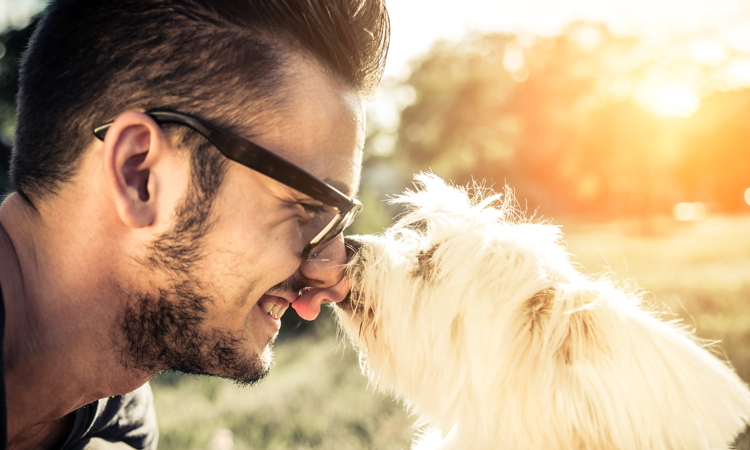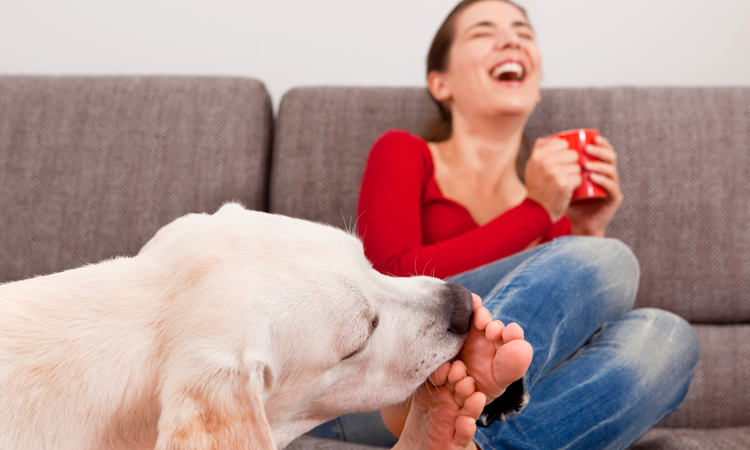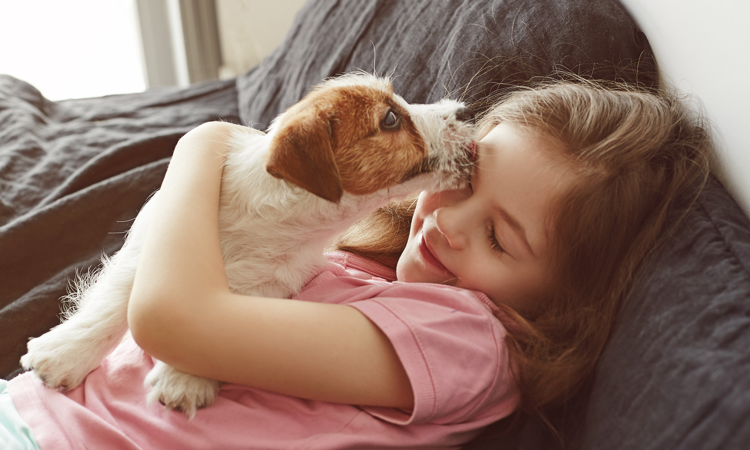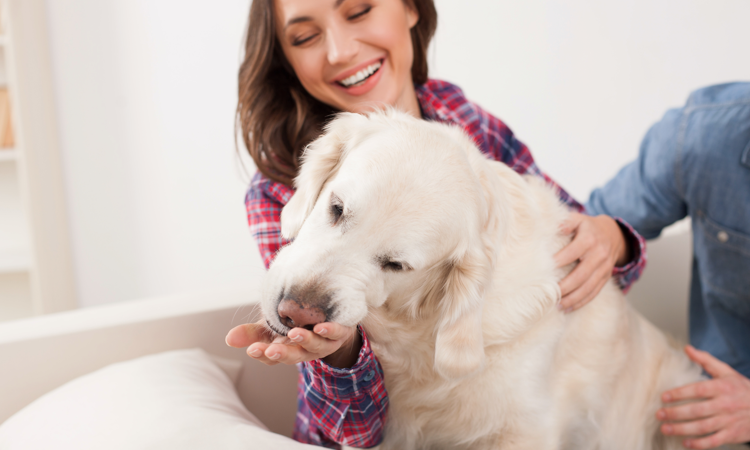There’s nothing quite like the feeling you get when your dog greets you after a long day at work. Cuddling on the couch with your furry friend can be one of the greatest joys in life. But when all that tail wagging and excited bouncing turns into a face licking fest, it’s not always welcome.
Dogs have entirely different ways of communicating with us. They can’t communicate through words, so instead use body language to show us their wants and needs.
Licking is an instinctual behaviour they practice even from birth. A mother will lick to clean their young and stimulate breathing, while puppies will eagerly lick around their mother’s mouth. This early stage puppy licking is believed to be a symbol of submission, or a simple gesture to say they’re hungry.
However, when your dog licks you it can have many different meanings. Here are a few reasons why your dog may lick you.
Why do dogs lick you?

For attention
Some dogs may lick to get what they want. Whether that’s a belly rub, food or an invitation to play. Dogs are pack animals and love being the centre of our world. So if you’re busy doing household chores or chatting with friends, poor Fido may be feeling a little neglected. Remember, our dogs can’t tell us how they’re feeling, it’s up to us to interpret their behaviour.
But all that licking could be a sign they want to go for a walk, they need a toilet break or they want some you time. So first, take a moment to consider if it’s something they need for their wellbeing.
Sometimes dogs will lick purely because they want your undivided attention, all the time. We all love that our dogs want to be with us, but if it’s excessive this can affect our ability to live life to the fullest. In which case those loveable licks are having a negative impact and should be discouraged. And if you interact with your dog while they’re licking, even if you’re telling them to stop, you’re giving them the attention they want. No matter what you’re communicating, this will reinforce your dog’s behaviour even if you’re trying to discourage it.
For sensory stimulation
As our salty sweat is naturally secreted through the pores of our skin, your dog may lick simply because they like your taste. When those sugars and salts from the foods we eat are broken down, this leaves behind (what your dog sees as) a delicious fleshy lollypop to go to town on! You may also find your dog licks you when you jump out of the shower or after you’ve applied lotion when your skin smells irresistible. And if it smells good, it must be good enough to lick, surely!
Dogs investigate their surroundings with their noses (which are amazing!) and mouth. It helps them explore and identify new places and people in the world. Think of it like us reaching out to touch new objects and materials with our hands. We learn about new things by touching and handling them. So if your dog isn’t particularly fussy about who they lick, it can be their way of exploring a new or unfamiliar face.
To show affection
Licking is most commonly associated with a sign of affection. We are the primary providers for our dogs and give them everything they need. As we play, interact and train our dogs we form a close bond. That same strong family tie can be likened to dogs in the wild. Wild dogs form close relationships to hunt and stay safe within the pack. Healthy, happy relationships are crucial for their survival. As dogs have become domesticated over the years, we are now a big part of that family pack.
Dogs show us affection in various ways, through tail wagging, facial expressions or by leaning up against us. But a key part of showing their love for us is through licking. It’s how they’d show their affection for their siblings and elders in a pack-like setting. If you give your dog any kind of attention while they lick you, they’ll assume you enjoy the experience. When dogs lick, natural chemicals known as endorphins are released. These happy hormones comfort and calm your dog which encourages them to continue their licking behaviour – it’s a happy-hormone inducing kind of positive reinforcement.
Other dog licking habits

Why does a dog lick its feet?
There are a number of reasons why your dog might lick their paws. Most of the time it’s because they’re wet or they have something stuck on them. Perhaps they’ve stepped in something sticky or they’re trying to get rid of grass. In this case, help your dog by removing the objects or pat their feet down with a towel.
If you can’t see anything obvious on your dog’s paws, they may have a medical issue. Allergies and yeast infections can become itchy and sore which makes your dog want to lick themselves. All dogs have yeast living on their skin and inside their gut – it’s part of a healthy immune system. But when this yeast grows out of control, your dog’s body responds to get rid of the fungus. Be sure to examine your dog’s paws to see if they have other symptoms such as redness, rusty coloured staining, sores or a smelly discharge.
Allergies and yeast infections can be extremely uncomfortable for your dog. If left untreated they can lick and gnaw to the point they draw blood. Take a trip to the vet immediately. The treatment can be as simple as a medicated shampoo, so it’s best to get it treated sooner rather than later.
Why does my dog like to lick the couch?
If you’re wondering why your dog is licking the couch, you’re right to question it – it’s pretty odd behaviour. But unless you recently dropped food on your couch, there’s no logical reason why your dog would lick there. Regular licking of the couch, the floor or a wall can be anxiety and stress related. They’re anxious about a particular event, object or person and licking is their form of relief. You may start to notice a pattern occur when they turn to their preferred place to lick.
The trigger could be a knock on the door or the hoover being switched on. In which case you may like to do some positive reinforcement training involving the trigger. By simply offering your dog a few tasty treats while the trigger occurs, this will help distract and show them there’s nothing to be scared of. Over time, this will start to ease your dog’s anxieties and help them associate the cause with positive things. However, if they lick the same place all the time like it’s second nature, they may have an obsessive-compulsive disorder. Read on to discover what might be causing this behaviour and how to help your dog deal with their habit.
Why does my dog lick my face?
When your dog licks your face, they could be trying to find out more about you, trying to clean you, or just saying hello. As if they’re communicating, “I like you, let’s be friends.” But as we mentioned above, puppies lick their mother’s faces to show they’re hungry, and also as a signal of submission. So they could be telling you it’s time for dinner or showing they think of you like family.
Dogs have an extraordinary sense of smell and could in all likelihood tell you what you had for breakfast, if they could talk. The reason they choose to lick your face specifically could be they’re merely curious about the smell coming from your mouth. Any food left on your face or lips could also be inviting them to clean you up. Think of it as their way of giving you a loving groom.
Why does my dog lick my baby so much?

When a dog licks a baby’s face, they could be trying to play with the baby or assert their dominance over the child. Besides the fact a dog’s mouth can harbour all kinds of germs and bacteria, you should discourage your dog from licking your baby for safety reasons, too.
It’s important you help your dog understand they’re not your baby’s playmate or master. Because if your child happens to step out of line (in your dog’s eyes) this could result in your dog biting your baby. We can only imagine the impact an event like this would have on your family. Our human babies are precious and we utterly adore our dogs. We wouldn’t want you to be thrown into an impossible situation where you have to consider rehoming your beloved pooch.
So to create a safe and well-balanced family environment, dogs should never be allowed to exhibit dominant behaviour over your child. Dogs should always be trained to be submissive to all children. As your children grow older, you should involve them in being in charge of feeding and training your dog. This will help your dog see your children as their leader and provider too.
Should I worry about my dog’s licking?
Some people have absolutely no issue with a friendly lick now and then. After all, licks can be a dog’s way of sharing a kiss, and who doesn’t love kisses? If it helps you feel closer to your dog and you enjoy their affection, a friendly lick from your affectionate pooch won’t do you any harm. We’d advise you wash your hands, face or licked area of your body afterwards though; the average dog’s mouth has 700 kinds of oral bacteria which can cause many types of infections.
Normal dog licking behaviour
It’s important to note that licking is a completely normal dog behaviour, in most circumstances. As we’ve already mentioned, dogs use it in a number of situations, whether to appease their owner or deal with their emotions. Just as we bite our nails, fidget, or tap our feet when we’re nervous.
It’s really important to remember that you should never punish your dog for licking you, your sofa or other objects in your home. If that’s your dog’s way of coping with stress and anxiety, scolding them will only make the problem worse. How would you feel if you were shouted at for using your coping mechanism? Someone being angry at you for doing something that comes naturally would only put you more on edge, right? Put yourself in your dog’s shoes and treat them with compassion and understanding, just as you would want to be treated yourself.
Obsessive-compulsive disorder
If your dog constantly licks and would happily do so for hours without intervention, they may have a more serious problem. They may choose to lick the same spot of a kitchen tile or a preferred window. This obsessive licking can come about from severe anxiety, boredom, and even a neurological or medical condition.
If your dog is under stimulated due to a lack of physical or mental exercise, they may have just found a habit they enjoy. Over time, that habit may grow into an obsession and become the fundamental way they keep their body and brain occupied.
Licking compulsions due to stress and anxiety can be more difficult to manage. If you have a particularly anxious dog, licking helps them manage emotions and deal with the world around them. There may have been a certain situation that initially triggered the behaviour, but that action is now helping them in many other circumstances too. They use it as a default in all situations they feel nervous or stressed.
A study has also revealed excessive licking can be linked to a range of gastrointestinal disorders, including irritable bowel syndrome, chronic pancreatitis and gastric emptying. So the problem is not always behavioural and you should consult a vet if you feel your dog has a medical problem.
How to stop your dog from licking you

1. Don’t use punishment
Never shout at or manhandle your dog for licking. If they’re performing the behaviour due to stress, you’ll make them more anxious and intensify the need to lick. This could also make your dog fearful of you, which may cause other unwanted behaviours. Always use positive reinforcement training to ease licking behaviour. This is the best way to get your dog to respond to you and get the results you want.
2. Keep greetings calm
Coming home and leaving for work are two highly emotional times for your dog. You may often be greeted by tail wagging, jumping, barking and a big slobbery kiss every time you walk through the door. But if you join in with the excitement and make a big fuss, you’re rewarding them for that behaviour. They’ll assume this is the appropriate way to greet people and the same behaviour will follow next time.
Instead, keep things calm and hold back from praising generously. Ignore your dog if they’re jumping up and trying to lick your face. Turn your back and only pet them when their body is relaxed and they’re keeping their tongue to themselves.
3. Leave the room
If your dog is licking you purely for affection and you’re not keen, you should ignore them. When they start licking, get up and leave the room. Our furry friends want to be close to us. They soon learn through your response what works and what doesn’t. If you regularly cave in to their licking and give them the attention they’re after, you’ll see more licking behaviour in the future. So if you consistently remove yourself whenever they start licking, they’ll soon get the message.
4. Reward good behaviour
It’s commonly known that you should reward all good behaviour and ignore the bad. Leaving the room will help deter unwanted licking, but using treat-based rewards will actively show your dog what you expect from them. Whenever your dog is calmly sitting next to you without licking, offer them treats and gentle praise. If they’re happy on the floor gnawing a chew, go over and pet them calmly. By giving them attention when they’re doing appropriate behaviour they’ll learn to understand what is acceptable in more general terms, too.
5. Use citrus-scented products
Most dogs dislike the smell and taste of citrus. It smells fresh and fragrant to us but can really put a dog off. Consider changing your body products to a citrus-scented variety to discourage your dog from licking you. You could use a body wash in the shower or a lotion you apply. This will leave the scent on your skin which will not seem so tasty to your dog anymore.
If your dog has a problem licking certain objects in your home you could also make up a lemon spray to curb their habit. Add lemon juice diluted in water to a spray bottle and squirt it onto problem areas. This works in a similar way to the bitter apply sprays you can buy to deter inappropriate chewing.
6. Redirect the behaviour
When your dog starts to lick you, redirection can refocus their attention on appropriate alternatives. Pick up a toy or a chew and put it down in front of them. Don’t start interacting or playing with your dog – that’ll give them the reward and attention they crave. Your dog needs to learn that attention is only given on your terms. The toy is just a distraction mechanism to stop them from licking you.
Licking usually isn’t a major problem for dogs and their owners. And in fact, some owners adore a good kiss and a cuddle from their dogs. But if you’re particularly adverse to your dog licking you and your possessions, explore the cause of the problem first. Use these tips to help your dog control their impulses, and if your dog’s a compulsive licker, seek advice from a trained vet and behaviourist.
How about you? Are your dog’s licking habits causing trouble at home? Share your story in the comments below or let us know on Twitter and Facebook using @DogBuddyCo.